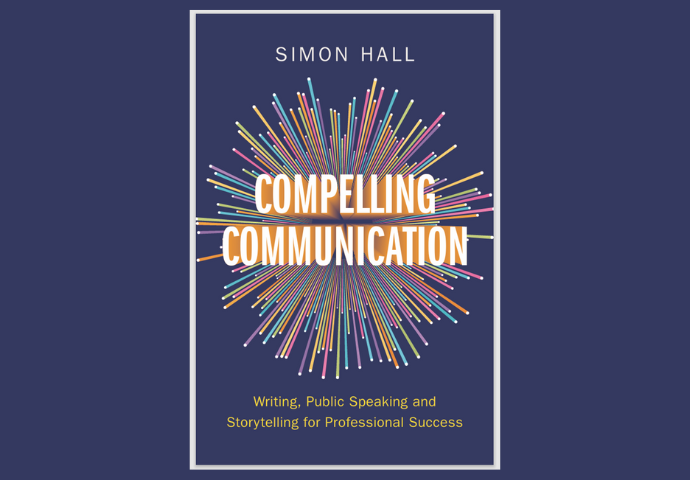It’s written by the leader of the University’s highly popular course, Compelling Communication Skills, Simon Hall, who is also a former BBC TV and radio News Correspondent.
The book, Compelling Communication, begins with the essentials of excellent writing and presenting. Which, as Simon notes, are far from what most people expect.
“It’s one of the curiousities of effective communication, that what we’re taught at school, learn in college, and experience in the world of work is completely and utterly wrong when it comes to getting a message across,” Simon says.
“Want to impress with a report? Make it lengthy, right? Want to inspire an audience with a talk? Go on and on and on, yes? Want to make it clear how clever you are? Use long words and even longer sentences, obviously. Well, sorry, but that’s wrong on all counts.
“Brevity, simplicity and clarity are the cornerstones of compelling communication, as we reveal right at the start of the book, with some important examples.”
From there, Compelling Communication examines the tricks of the writing trade, featuring insights from some of the world’s greatest authors.
“It’s interesting how you see the same techniques cropping up again and again in the most iconic writing,” Simon says. “Even better, they’re not difficult to replicate, so enhancing your own writing immensely.”
Storytelling comes next, with two chapters dedicated to the art.
“Far too few people appreciate the extraordinary power of storytelling,” Simon observes. “It’s nothing less than your secret weapon for impressing, influencing and inspiring. I always say – as I make very clear in the book - if you’ve got an important message you really want to make sure is heard, put it in the form of a story.
“In simple terms, facts fade, but stories stick. It’s as simple as that.”
The next two chapters in Compelling Communication will strike dread into many. They cover the fearful land of public speaking and presentations.
“I read a survey which said many people fear giving a talk more than they do death!” Simon comments. “Which is really quite an insight into how scary presenting can be.”
“If that’s you, then don’t worry. Compelling Communication can help. Public speaking is a skill which can be learned. By studying the tricks and techniques of the masters, as we do in the book, you can find your own unique style and strut it commandingly and confidently.”
The next chapter covers an area which makes many people groan, but it inescapable and essential in modern life: the online world.
“We look at how to establish an effective and impressive online presence for yourself, without having to spend too much time doing so,” Simon says. “I particularly enjoyed sharing a story about going viral, courtesy of some schoolboys staging a protest by wearing skirts, back in my BBC days. That was quite a memory, and it offers important learning about making an impact online, too.”
The penultimate chapter of Compelling Communication offers advice about how to get featured in the media, the best form of publicity there is. It also gives tips about being interviewed by journalists, including taking lessons from some of the biggest media disasters ever seen.
Finally, the book explores the lesser known art of strategic communication, how to use your new skillset to achieve your aims in life.
“Compelling Communication is itself a story,” Simon concludes. “Because, as I may just have previously mentioned, facts fade but stories stick.
“The book tells a story of how you too can become a great communicator. The one about who people whisper, ‘I wish I could write like that’. Or say, ‘Wow, I wish I could give a talk that captivates an audience in that way.’”
Compelling Communication is published by Cambridge University Press. You can find out more about the book here.
All members of Cambridge Network are also warmly invited to the launch event, at the Cambridge University Press bookshop in the heart of the city, next month. You can book a ticket here.



